Last updated on February 16th, 2024
How much does a new kitchen cost?
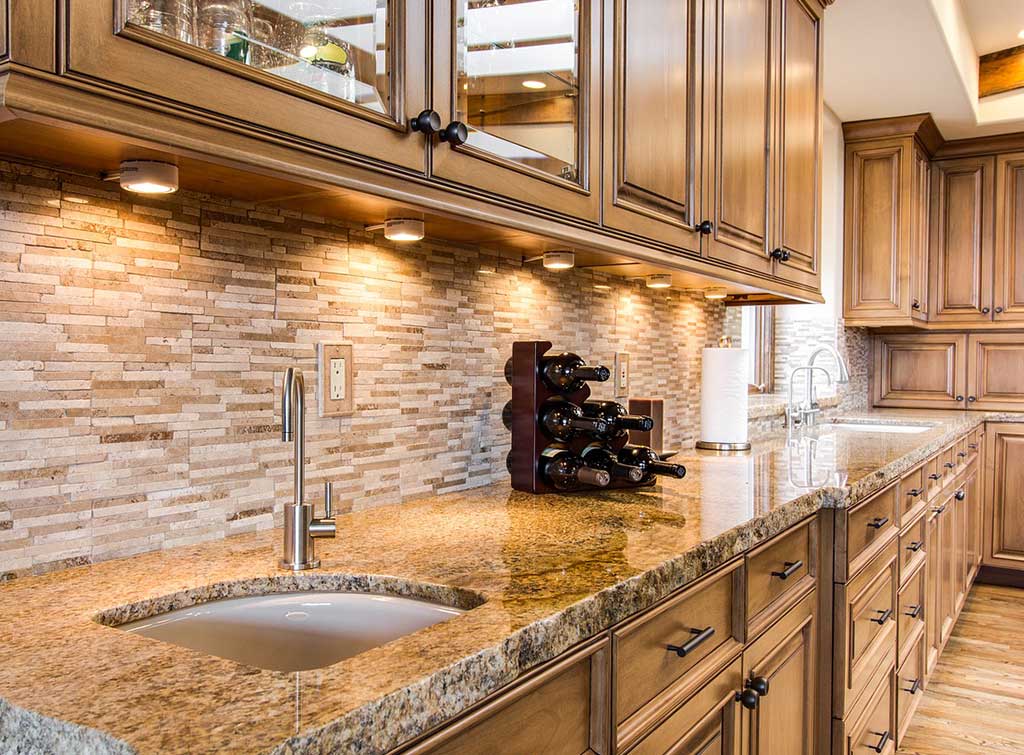
Before you start tearing out your current kitchen and ordering your new one, it’s essential to consider how much a new kitchen could cost you. Knowing the rough new kitchen costs allows you to budget sensibly for your new kitchen design and fittings.
Keep reading to find out how much a new kitchen typically costs – from the kitchen itself to the installation.
The cost of a new kitchen
The cost of a new kitchen can vary hugely depending on a number of factors, including:
- Its size
- The brand
- Which appliances you choose
- The quality of the fixtures and fittings
- The scope of the project (eg. are you also updating your kitchen floor and lighting?)
On the one hand, a very small budget kitchen could cost under £7,000. On the other hand, a large, bespoke kitchen could cost up to £100,000.
These costs include the labour involved in removing your existing kitchen and installing your new one. They also include new flooring, plumbing, decorating and a few key appliances such as a built-in cooker, hob and hood.
Of course, this is a huge price range. So, it’s important to be really clear on the scope of your project and how much you have to spend before you start your kitchen revamp.
How much does it cost to install a new kitchen?
Of course, you don’t just have to budget for your new kitchen itself when you’re planning a kitchen refresh – you also have to budget for installation.
As a rough guide, you could expect to pay in the region of £2,200 to have a small kitchen installed, or £4,600 to have a large kitchen installed.
However, just like the cost of the kitchen itself, installation costs will vary hugely depending on the size of your kitchen, its spec and the scope of the project. You’ll also have to factor in your location, as the price of labour tends to be higher in cities (especially London).
Some kitchen companies will include installation when they provide you with a new kitchen. Other times, you’ll need to find a kitchen fitter yourself. Don’t forget, as well as a kitchen fitter, you’ll need the expertise of other tradespeople to complete the job too. This usually includes a plumber, electrician, Gas Safe registered engineer, plasterer and painter and decorator.
So, what is the average cost of fitting a new kitchen in the UK?
It’s estimated that the UK average someone pays for their new kitchen to be fitted is around £3,500 (not including the cost of the kitchen itself).
Our cost table below will give you ballpark averages for the individual components.
| New kitchen items | Low cost (small kitchen) | High cost (large kitchen) | Average cost |
|---|---|---|---|
| Units | £1,500 | £10,000 | £3,000 |
| Worktops | £100 | £5,000 | £1,000 |
| Appliances | £450 | £5,200 | £2,000 |
| Kitchen installation | £2,200 | £4,600 | £3,000 |
| Plumbing | £200 | £600 | £300 |
| Electrics | £300 | £1,000 | £500 |
| Flooring | £500 | £2,000 | £750 |
| Total cost | £5,250 | £28,400 | £10,550 |
Our costs are ballpark averages – get a local tradesperson to quote now
But remember, these are ballpark, national averages, so the cost of your new kitchen will differ to these based on several factors, including location.
The low estimates here are based on a small kitchen with one wall of eight budget units, a laminate worktop, cooker, hob and hood (all budget brands).
The high estimates are based on a large kitchen with 20 premium units plus an island, quartz worktop, cooker, hob, hood, fridge/freezer, dishwasher and microwave (all premium brands).
New kitchen cost calculator
As you can see, there’s a huge range in costs when it comes to forking out for a new kitchen. So, let’s take a look at roughly how much you could expect to spend.
- Units: A standard kitchen cupboard unit costs between £20 and £70, or between £20 and £50 for a wall unit. Higher-quality units cost between £70 and £130 for a base unit and between £70 and £100 for a wall unit
- Kitchen worktop: For a 5m length of kitchen worktop, you can expect to spend between £200 and £800 for laminate; between £300 and £900 for wood; between £500 and £1,100 for quartz; and between £550 and £1,150 for granite
- Appliances: For a cooker, hob and hood from budget brands, you can expect to pay around £450. In contrast, if you want a cooker, hob, hood, fridge/freezer, dishwasher and microwave, all from premium brands, you’re looking at closer to £5,200
- Plumbing: The typical plumber will charge between £40 and £60 per hour, or between £325 and £375 per day
- Electrics: An electrician will typically charge around £55 per hour or £400 per day
- Kitchen fitting: The average day rate of a kitchen fitter is around £240
For help planning your kitchen renovation project, bearing in mind your budget, check out our dedicated guide.
Additional kitchen costs to consider
Let’s be honest, if you’re looking to transform your kitchen, there’ll probably be a few other things you want to have done to perfect it.
To begin with, there might be parts of the room that need to be repaired before you even start fitting your new kitchen. For instance, you might need to plaster the walls – a plasterer is likely to charge around £1,100 to plaster a small room, or £1,900 to plaster a large one.
Similarly, you might want to upgrade your electrics or fusebox while you’re having your kitchen redone. A complete kitchen rewire will usually cause you to spend around £1,000 on electrics.
Then, once your kitchen has been fitted, there are a few finishing touches that you won’t want to scrimp on. The average painter and decorator charges around £325 per day. With that in mind, the average cost to paint a room is £400, while the average cost to wallpaper a room is £450.
Depending on your situation, you may also want to factor in new kitchen lighting, shelving, picture hanging and more. The best way to stick to a budget is to make a list of everything you need before undertaking your kitchen renovation – even down to these small details – so that you can properly factor in everything from the beginning.
Kitchen flooring costs
You can save money by keeping your existing kitchen flooring in place. But if you want a whole new look for the ‘heart of the home,’ you’ll likely want to upgrade your floors.
- Vinyl flooring. Between £10 and £40 per m2, plus around £225 per day for installation.
- LVT flooring. Between £15 and £60 per m2, plus around £250 per day for installation.
- Laminate. Between £20 and £60 per m2, plus around £25 per m2 for installation.
- Wood flooring. Between £35 and £60 per m2, plus around £35 per m2 for installation.
- Cork flooring. Between £40 and £70 per m2 for supply and installation.
- Polished concrete floor. Between £120 to £150 per m2 for supply and installation (or just £50 per m2 if you have an existing concrete floor that you want polished).
- Tile. Between £20 and £400+ per m2, plus around £300 per day for installation.
Pssst! Don’t forget that you can tile your kitchen walls too! Our kitchen wall tile ideas have got you covered.
How to keep new kitchen costs down
If you’re planning a kitchen renovation on a budget, you might be wondering how you can keep costs down.
It’s important not to scrimp on quality, especially when it comes to kitchen fitting. A well-fitted, durable kitchen will help you avoid expensive repairs and replacements later down the line. However, here are a few things you can do to lower your new kitchen costs.
1. Find a fitter yourself
Sometimes, kitchen companies that both supply and install your kitchen will charge a premium for it. By finding a kitchen fitter yourself instead of using your kitchen supplier, you might be able to save some pennies.
Expertise and quality often come with a higher price tag, so it’s important not to look for the cheapest kitchen fitter you can find – instead, focus on finding one that’s got great reviews and will take the time to get the job done to a high standard. That way, you can make sure your kitchen has the best chance of lasting a long time to come.
Use our request a quote feature and we’ll send the details of your job to excellent kitchen fitters in your area to provide you with a quote. Or, simply enter your postcode below to browse a selection of the best kitchen fitters near you.
2. Negotiate
When it comes to kitchens, there are often deals to be done. We’d recommend negotiating with the company selling you your kitchen to see if there’s room for manoeuvre on the price.
You may also be able to save money by negotiating a package that includes units, appliances and other elements.
3. Don’t replace the whole kitchen
You could save a significant amount of money by keeping or reusing choice parts of your existing kitchen. For instance, you could keep some of your existing appliances.
Alternatively, you could keep the frames of your units and replace the doors only. If you’re on a really tight budget, you could even paint or wrap your existing kitchen doors.
4. Source parts of your kitchen yourself
You may be able to save money by sourcing parts of your kitchen yourself online. This is particularly the case when it comes to appliances, which will often take up a good portion of your budget.
You don’t have to accept the appliances offered by your kitchen supplier (unless they have a policy that forbids you from buying your own). Instead, shopping around for similar items that are on sale could save you a lot. It will also allow you to pick appliances that have good reviews, so that you can hopefully avoid expensive repair costs later down the line.
Of course, if you’re happy to source parts of your kitchen yourself, don’t forget that your kitchen doesn’t have to be brand new to count as your new kitchen. One affordable kitchen idea is to buy second-hand or ex-display units.
5. Cut down on premium brands
Buying items that are good quality is really important. However, that doesn’t always mean forking out for premium brands, which often cost a lot more.
If you want to give your kitchen a high-end look, why not opt for premium brand appliances that will be on show (like your cooker) but use budget brands for integrated appliances?
Just make sure that you think twice before sending money over to a budget brand you’ve never heard of. Make sure there’s a solid warranty in place and read the reviews first. It’s not worth saving a few pounds now if it means having to replace your new appliance just a few years later!
6. Choose less expensive materials
Every item in your kitchen will come at a cost, from the kitchen units to the handles, the worktop to the flooring. For a premium look that doesn’t come with such a hefty price tag, why not opt for expensive materials only where they’ll really impact the overall look and finish of your kitchen?
For instance, you could opt for cheaper kitchen carcasses and more expensive doors. Or even just more expensive handles! There’s no need to choose the premium option at every turn when just a little extra here and there can make a big difference.
Having said that, you should also take into account the longevity of the items and materials you’re purchasing, as lower-quality materials could lead to costly repairs and replacements later down the line. For instance, flat-pack units might be cheaper, but pre-assembled units are likely to be sturdier because the joints have already been fixed together (this will also save your kitchen fitter time, saving you money on installation too!).
7. Minimise layout changes
Reconfiguring your kitchen can really help you to transform the space and use it in a whole new way. But it comes at a cost!
The more plumbing and electrical wiring that needs to be moved, the higher your installation costs will climb. The simple act of moving a dishwasher, a cooker or a fridge can mean moving water pipes, electrical outlets and even gas pipes if you have a gas cooker. This can add extra work and really push up your costs.
Similarly, if you want to remove load bearing walls to create an open plan kitchen, this could add thousands of pounds to your kitchen renovation. At the end of the day, it’s all about balancing your requirements with your budget, and asking yourself ‘is it worth it?’ The answer may well be yes!
How to design your new kitchen for your UK home
One of the key steps to success when designing your new kitchen is to put together a well-thought-out plan. Whether you’re updating certain aspects of your existing kitchen on a budget or looking to strip it all out and start afresh, planning is vital.
By design, we don’t mean simply considering the colours and other aesthetics. You must also consider the practical elements of your kitchen, such as lighting, plug sockets, flooring, storage options and many more things that come into play when making these decisions.
Our step-by-step guide on how to design a kitchen will help. However, there’s no need to design your whole kitchen alone! While it’s great to have an idea of what you want, a kitchen designer will be able to help you turn your ideas into a reality. Which brings us onto…
How much does a professional kitchen designer cost in the UK?
We estimate that working with an independent kitchen designer will cost you around £5,000 for a very high-end kitchen (over £25,000).
However, most kitchen suppliers will offer a kitchen design service for free, in an attempt to get you to buy your kitchen from them. In this way, it’s combined with the cost of the kitchen itself, almost like an all-in-one package. When you’re looking for quotes, do make sure to ask whether the cost includes your kitchen’s design and installation.
Working with a professional designer may be the key to helping you to understand how far your budget can stretch. They will also have the knowledge to help you choose the right layout for your needs and ensure that you remember everything that must be considered.
We have a kitchen fitting cost calculator that could help you consider what you want in your kitchen and the cost to have it. Plus, check out our kitchen design cost guide for kitchen island, kitchen tile, and kitchen extension costs.
How to choose your kitchen worktops and their costs
Before you choose your new kitchen worktops, you’ll need to choose the material.
| Cost provided item | Cost + VAT (Range low - high) | Average UK cost |
|---|---|---|
| Kitchen worktops - Laminate (5m length) | £200 - £800 | £500 |
| Kitchen worktops - Quartz (5m length) | £500 - £1,100 | £800 |
| Kitchen worktops - Wood | £300 - £900 | £600 |
| Kitchen worktops - Granite (5m length) | £550 - £1,150 | £850 |
| Labour - Laminate (per m2) | £40 - £60 | £50 |
| Labour - Granite (per m2) | £120 - £180 | £150 |
| Labour - Quartz (per m2) | £80 - £130 | £110 |
| Kitchen doors | £95 - £145 | £120 |
| Unpolished cutouts (Quartz/Granite) | - | £180 |
| Polished cutouts (Quartz/Granite) | - | £185 |
| Drainer grooves (Quartz/Granite) | - | £150 |
| Curved corners (Quartz/Granite) | - | £15 |
| Round edges (Quartz/Granite) | - | £14 |
Each material has its pros and cons. For instance, although laminate worktops can be bought for very affordable rates, it’s unlikely that they will last for as long as a stone such as granite.
Here’s a quick lowdown on some of the main worktop options you can choose from.
- Laminate worktops – These are a budget-friendly option that can mimic the appearance of more costly materials. That said, they are unlikely to last as long and can be damaged easily.
- Wooden worktops – This material can look excellent but requires regular upkeep, making them an often costly option in the long term.
- Granite worktops – No two cuts will be the same with this natural stone. It’s exceptionally durable, difficult to scratch, and will stay looking shiny and new for years to come. Granite worktops are porous but will be sealed, meaning day-to-day cleaning is simple – over time, if this seal does begin to wear, you might find your worktop is susceptible to staining and liquid absorption.
- Quartz worktops – This man-made material is exceptionally tough and will withstand the hustle and bustle of everyday use. Although it does not quite achieve the aesthetic depth that natural stone provides, it does come in a wide range of colours, patterns and styles, which means that there is a cut of quartz to suit every home. Non-porous and extremely hygienic, you will find that quartz provides you with a long term solution that suits your needs.
How to choose cupboards for your new kitchen
When it comes to choosing your new kitchen cupboards, you must consider what your priorities are.
- What do you need to store within them?
- How many shelves do you need?
- Would you prefer lots of thinner shelves, or would fewer taller ones benefit you more?
- Where will you be placing them?
- How many cupboards do you need?
- Do you need to invest in any other additions to your cupboards, i.e. built-in wire racking?
In an ideal world, you’ll want to design your kitchen in such a way that every small nook and cranny can be utilised to its best ability – you’ll be surprised to realise just how versatile kitchen units can be. You can fit a cupboard or drawer almost anywhere in a kitchen space.
That said, budget kitchen suppliers will usually only sell kitchen cabinets in set sizes. So, if you have a really tricky, awkward space, you might find you’re better able to maximise it by forking out for a bespoke kitchen.
When you’re picking out your kitchen cabinets, you’ll also need to take into account the materials. Are you going to be looking for solid timber units or wood-veneered? Planning well in advance is essential with such a range of patterns, styles, and materials available to choose from.
How much does it cost to fit kitchen cupboards?
The price of your kitchen cabinets will depend on their material, as well as whether they arrive flat-pack or pre-assembled. You’ll also have to factor in installation costs.
It’s estimated that a kitchen cupboard installation will cost around £225, not including the material cost. The cost of a standard kitchen cupboard unit will be between £20 and £70, or between £20 and £50 for a wall unit. Higher-quality units will be between £70 and £130 for a base unit and between £70 and £100 for a wall unit.
Although pre-assembled units are more expensive than flat-pack units, they tend to be sturdier as the joints have already been fixed together (this will also save your kitchen fitter time). Similarly, joints that rely entirely on wooden dowels and glue won’t be as robust as joints that use screws or metal studs and cams.
Ultimately, choosing quality units will save you money in the long run.
Selecting the right appliances
Another thing that homeowners must take into consideration when installing their new kitchen is whether or not they are going to be installing completely new appliances.
- Are you going to be opting for all-new kitchen appliances?
- Do you want built-in or freestanding appliances?
- Will you need to reroute plumbing and electrical wiring to meet the needs of your new layout?
- Are you going for gas appliances? If so, have you got the contact details of a reputable Gas Safe registered engineer?
It’s essential to think about not only the type of appliance you require but also the costs and practicalities of having that appliance.
Once again, the cost to have your appliances fitted will rely on what appliance you’re having fitted, whether it’s electric or gas, and the price for both the appliance itself and the labour to install it.
When you’re buying a new kitchen appliance, always read the reviews to make sure it’s a reputable item, and check that it comes with a decent warranty.
Save money with a quality kitchen
As you can see, there are countless decisions that you’ll have to make when you’re looking for a new kitchen. However, if there’s one point we hope you’ll take away with you, it’s the importance of quality.
Buying quality items doesn’t always mean buying the most expensive. But it does mean searching for items that are durable, long-lasting and well reviewed. That way, you can avoid having to fork out on expensive repair and replacement costs anytime soon.
Choosing a quality kitchen fitter – as opposed to just choosing the cheapest near you – is paramount. Read reviews, chat to them and look at pictures of past projects to reassure yourself that a kitchen fitter has the care, expertise and attention to detail that they need to do a high-quality job on your kitchen. This will save you money in the long run by ensuring that your kitchen lasts long into the future.
By choosing a Checkatrade Approved member, you can get peace of mind that your kitchen fitter has passed up to 14 checks and can be trusted. Not only that, but when you contact a trade through Checkatrade, our guarantee could cover you for up to 12 months. You can claim up to £1,000 (exclusions and T&Cs apply).
FAQs
How long does fitting a new kitchen take?
The time it takes to fit a new kitchen will vary from project to project. If you have a small, simple kitchen then it might take just a few days. On the other hand, a medium-to-large kitchen could take one to two weeks. If you’re attempting a DIY installation, it could take even longer.
The level of work required will affect the timescales surrounding the project. If you’re undergoing a complete kitchen renovation (for instance, having everything ripped out, new flooring installed, walls redecorated, units added, appliances fitted, splashbacks and tiling installed, worktops cut etc.) then you can expect your project to take at least half a week, if not more. Speak to a professional kitchen fitter when getting your quote to estimate the duration of installing your new kitchen.
How much is the labour cost to fit a kitchen?
A kitchen fitter will typically charge £20 – £30 per hour. For more information, have a read of our guide on the cost of kitchen fitting.
Should you hire a professional kitchen fitter?
We would always recommend hiring a reputable professional to take on any big installation projects in your home. They will be able to get things done quickly and efficiently and have the skills and insurance in place to ensure that the job is done safely and correctly to all the right regs.
Does a new kitchen add value?
Yes! A new kitchen can add as much as 10% to your home’s value. That said, this will depend on the size, design and quality of your new kitchen.
Check out our guide to how much value a new kitchen adds to your home to learn more.
How much is a good kitchen in the UK?
That really depends on the size of your kitchen and the scope of your project. The average someone pays for a new kitchen to be fitted in the UK is around £3,500. However, a high-end kitchen will often cost in the region of £30,000 to £55,000.
What costs the most in a kitchen?
You kitchen cabinets will usually make up the biggest portion of your new kitchen cost – mostly because kitchens tend to have many of them! This is especially the case if you are investing in a bespoke kitchen.
Do kitchen fitters remove the old kitchen?
Yes! Kitchen fitters will usually remove your old kitchen as well as installing your new one. Usually, this will be included in the cost of your new kitchen installation, although it’s always worth checking to make sure.
Just bear in mind that there will be a few things that your kitchen fitter will likely not be able to remove – for instance, only a gas engineer can legally disconnect a gas appliance. Similarly, while some kitchen fitters will be willing to remove radiators, others would rather this was done by a heating engineer. So, always ask exactly what’s included before work begins.
Did you enjoy this new kitchen cost guide?
We have tons more free advice and inspiration ideas for your home and garden. You can get more of where that came from by signing up to get our free newsletter.
Find and book your trade with us and we'll guarantee their work up to £1,000*.
Guaranteed for 12 months. Eligibility and T&Cs apply

Working with professional estimators, we collate cost estimates for the common home improvement and repair jobs in the UK.
All the costs are estimates only. For accurate costs for your particular requirements, you are encouraged to reach out to professional tradespeople to receive a quote for your job.
Our estimators are Chartered Members (MRICS) of the Royal Institution of Chartered Surveyors and Members of the Chartered Institute of Building (MCIOB). See full disclaimer.
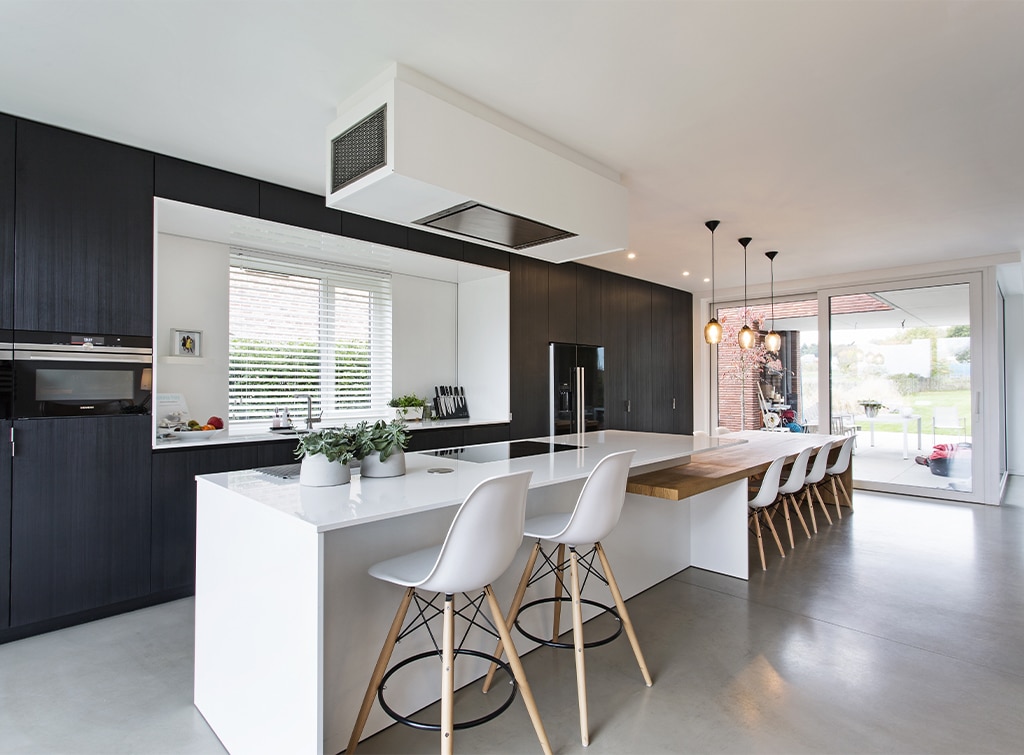
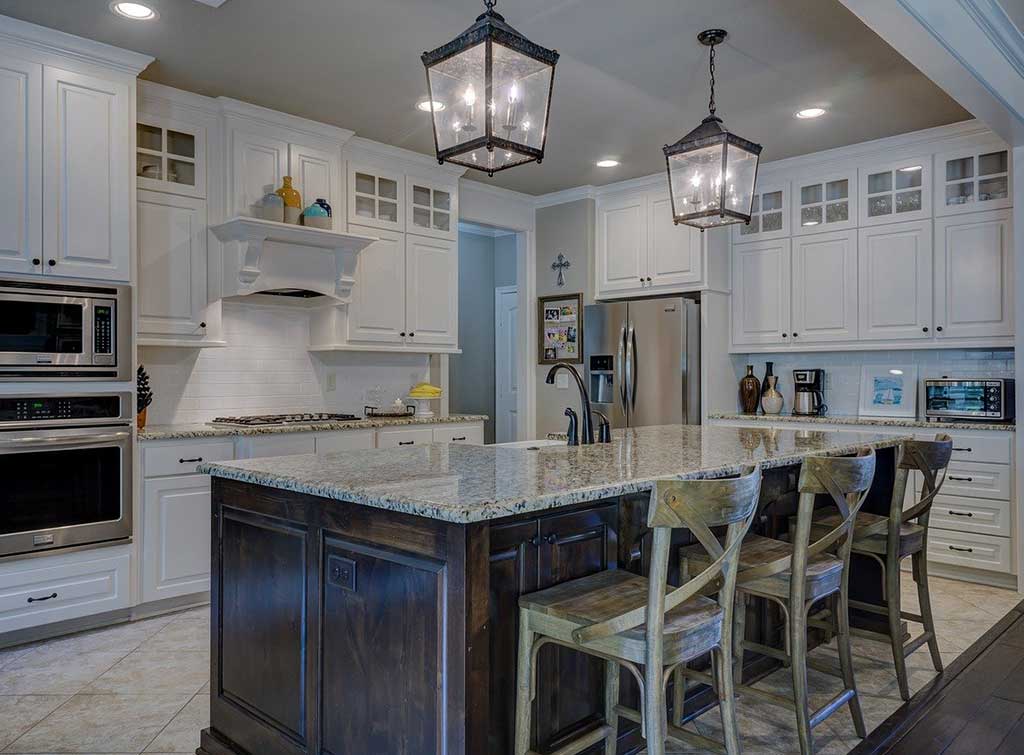
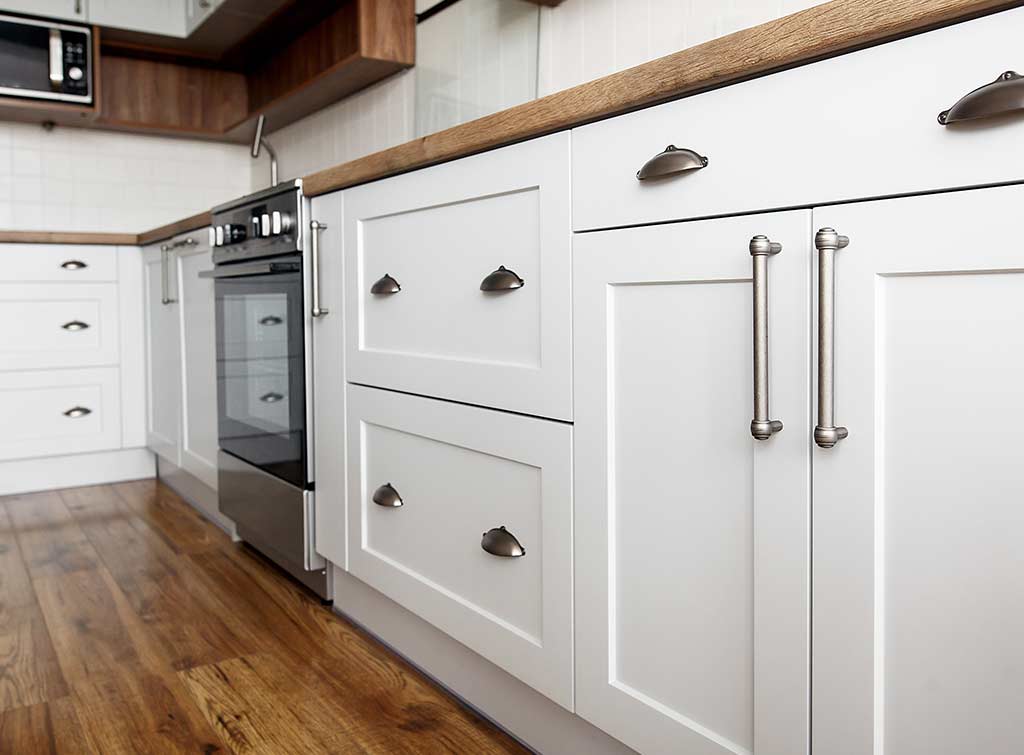
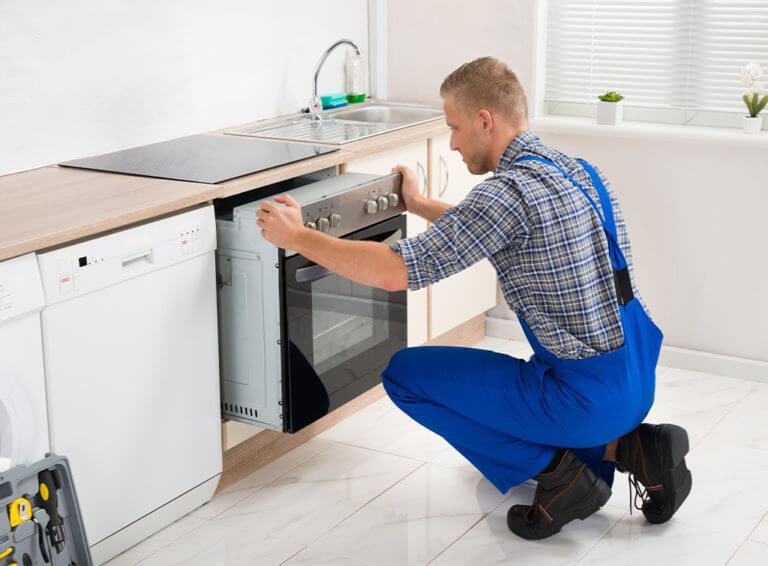
Carol
Helpful, I came to similar figures myself so this pleased me
Terry
Excellent article. Thanks for the advice.
Maylina
Brilliant article. Lots of really useful information. Appreciate the time and effort that has gone in to all the research and lay out to make it all easy to understand.
Emily
Very helpful overview and the cost breakdowns were great
Katie Hardy
Excellent and informative article. Thank you
Sue McGreggor
What a great article - thank you.
Peter Bargewell
Very informative, thank you
John CURRY
Very helpful, to anyone who as never done this before.
NIKI HOLLAND
EXTREMELY HELPFUL ARTICLE. THANK YOU
Shirley Breeze
Have decided to give my kitchen entire makeover so this info has been valuable. Made tons of notes to keep by my side when I get started. Will keep checking for any new pointers.
Irene Norman
Very useful information thank you.